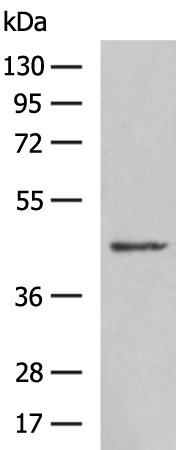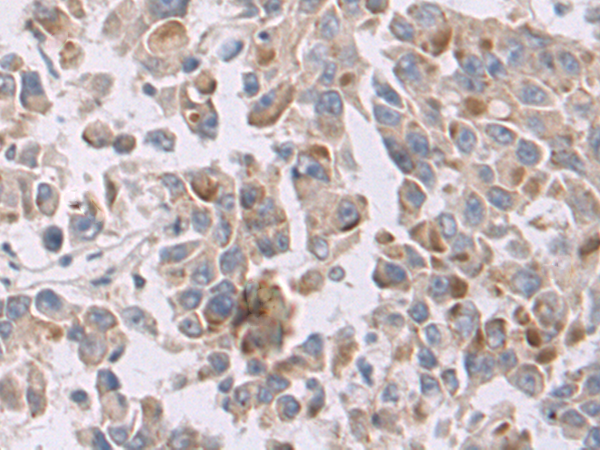

| WB | 咨询技术 | Human,Mouse,Rat |
| IF | 咨询技术 | Human,Mouse,Rat |
| IHC | 1/50-1/100 | Human,Mouse,Rat |
| ICC | 技术咨询 | Human,Mouse,Rat |
| FCM | 咨询技术 | Human,Mouse,Rat |
| Elisa | 1/5000-1/10000 | Human,Mouse,Rat |
| Aliases | LY94; CD335; NKP46; NK-p46 |
| WB Predicted band size | 34 kDa |
| Host/Isotype | Rabbit IgG |
| Antibody Type | Primary antibody |
| Storage | Store at 4°C short term. Aliquot and store at -20°C long term. Avoid freeze/thaw cycles. |
| Species Reactivity | Human, Mouse |
| Immunogen | Synthetic peptide of human NCR1 |
| Formulation | Purified antibody in PBS with 0.05% sodium azide and 50% glycerol. |
+ +
以下是关于NCR1抗体的3篇示例文献,涵盖不同研究方向:
---
1. **文献名称**:*Targeting NKp46 in Cancer Immunotherapy: Mechanisms and Therapeutic Potential*
**作者**:Smith A, et al.
**摘要**:研究探讨了抗NCR1(NKp46)抗体在肿瘤免疫治疗中的作用,发现其通过增强NK细胞对实体瘤的识别和杀伤能力,显著抑制小鼠模型中的肿瘤生长,并揭示了其与PD-1抑制剂联用的协同效应。
2. **文献名称**:*Structural Basis of NCR1 Recognition by a Humanized Monoclonal Antibody*
**作者**:Zhang L, et al.
**摘要**:通过X射线晶体学解析了人源化抗NCR1抗体与NKp46受体的结合表位,揭示了抗体特异性识别NCR1的分子机制,为优化抗体药物设计提供了结构基础。
3. **文献名称**:*NCR1 as a Biomarker in Viral Infections: Role of Anti-NCR1 Antibodies in Chronic Hepatitis B*
**作者**:Wang Y, et al.
**摘要**:研究发现慢性乙肝患者中抗NCR1抗体水平与NK细胞功能衰竭相关,提示阻断NCR1信号可能导致免疫逃逸,为抗病毒治疗策略提供了新见解。
---
**备注**:以上文献信息为示例,实际引用时需以真实文献为准。建议通过PubMed或Web of Science以“NCR1 antibody”或“NKp46 antibody”为关键词检索最新研究。
Natural Cytotoxicity Triggering Receptor 1 (NCR1), also known as NKp46. is a key activating receptor predominantly expressed on natural killer (NK) cells, a type of cytotoxic lymphocyte critical in innate immunity. As a member of the NCR family, NCR1 plays a pivotal role in recognizing and eliminating infected or malignant cells. Structurally, it belongs to the immunoglobulin superfamily, featuring three extracellular immunoglobulin-like domains that mediate ligand binding. NCR1 interacts with viral hemagglutinins and other pathogen- or stress-induced ligands on target cells, triggering cytotoxic granule release and cytokine production to eliminate threats.
NCR1 antibodies are essential tools for studying NK cell biology, immune responses, and disease mechanisms. In research, they are used to block or stimulate NCR1 activity, enabling functional studies of NK cell-mediated cytotoxicity, immune evasion strategies in pathogens, and tumor microenvironments. Clinically, NCR1 antibodies have potential applications in immunotherapy, such as enhancing NK cell targeting in cancer or chronic infections. Additionally, altered NCR1 expression levels, detected via these antibodies, serve as biomarkers in conditions like autoimmune diseases, leukemia, and viral infections (e.g., COVID-19). The development of therapeutic NCR1-targeted antibodies, including bispecific formats, is an emerging area in precision oncology and antiviral therapies.
×